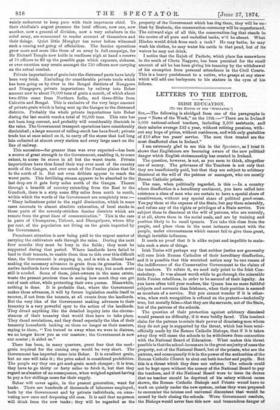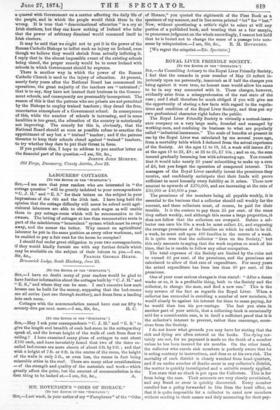LETTERS TO THE EDITOR.
IRISH EDUCATION.
70 THE EDITOR OF THE "SPECTATOR.")
Sin,—The following is abridged from one of the paragraphs in- your " News of the Week," on the 13th :—" There are in Ireland 9,000 national-school teachers, including 2,500 assistants, and their salaries average £42 a year, without retiring pensions, with- out any hope of prizes, without residences, and with only gratnitiee. of £10 after ten years' service. The men thus treated are the- most disaffected class in Ireland."
I am extremely glad to see this in the Spectator, as I trust it shows that Englishmen are becoming aware of the new political danger which English statesmanship has created in Ireland.
The question, however, is not, as you seem to think, altogether one of money. The grievance of the Teachers is not only that they are insufficiently paid, but that they are subject to arbitrary dismissal at the will of the patrons or managers, who are mostly Roman Catholic priests.
The case, when politically regarded, is this :—In a country where disaffection is a hereditary sentiment, you have called into existence a class of men who are certain to have a special share of sensitiveness, without any special share of political good-sense. You pay them at the expense of the State, but pay them miserably, and refuse any of the rights or privileges of a State service. You subject them to dismissal at the will of patrons, who are scarcely, if at all, above them in the social scale, and are by training and position likely to be small tyrants. You take this class from the people, and place them in the most intimate contact with the people, under circumstances which cannot fail to give them great, though invisible influence.
It needs no proof that it is alike unjust and impolitic to main- tain such a state of things.
Irish Tories will perhaps say that neither justice nor generosity will cure Irish Roman Catholics of their hereditary disaffection,. and it is possible that this wretched notion may be one reason of the indifference of the Conservative Government to the claims of the teachers. To refute it, we need only point to the Irish Con- stabalary. It was almost worth while to go through the miserable little Fenian rebellions, in order to be assured of their loyalty. As you have often told your readers, the Queen has no more faithful subjects and servants than Irishmen, when their position is assured' as members of a service. But yen cannot wonder if it is other- wise, when such recognition is refused on the pretext—technically true, but morally false—that they are the servants, not of the State, but of the patrons of the schools.
The question of their protection against arbitrary dismissal would present no difficulty, if it were boldly faced. This insolent claim for the patrons to retain their power of dismissing men whom they do not pay is supported by the threat, which has been semi- officially made by the Roman Catholic Bishops, that if it is taken away they will cause the schools to be withdrawn from connection- with the National Board of Education. What makes this threat possible is that the school-houses are in the great majority of cases the property, not of the National Board, but of the priests, who are the patrons, and consequently it is in the power of the authorities of the Roman Catholic Church to shut out both teacher and pupils. But this is a threat which they dare not enforce. The schools could• not be kept open without the money of the National Board to pay- the teachers, and if the National Board were to issue its decree that no teacher should be deprived of his salary without cause shown, the Roman Catholic Bishops and Priests would have to work on quietly under the new system, unless they were prepared to encounter the intense and universal discontent that would be caused by their closing the schools. Were Government resolute, the Bishops would never face this new and tremendous danger of a quarrel with Government on a matter affecting the daily life of the people, and in which the people would think them in the wrong. It is true that " denominational education " is a cry at Irish elections, but they can know nothing of Ireland who infer that the power of arbitrary dismissal would commend itself to Irish electors.
It may be said that we ought not to put it in the power of the Roman Catholic Bishops to inflict such an injury on Ireland, even though we believe they would shrink from actually inflicting it. I reply that in the almost impossible event of the existing schools being closed, the proper remedy would be to cover Ireland with schools in which Government should be supreme.
There is another way in which the power of the Roman Catholic Church is used to the injury of education. At present, nearly forty years after the National Board has commenced its operations, the great majority of the teachers are " untrained ;" that is to say, they have not learned their business in the Govern- ment schools, and consequently are presumably incompetent. The reason of this is that the patrons who are priests are not permitted by the Bishops to employ trained teachers ; they dread the free, unsectarian atmosphere of a Government school. In consequence of this, while the number of schools is increasing, and in some localities is too great, the education of the country is notoriously not improving. The remedy for this is, obviously, that the National Board should as soon as possible refuse to sanction the appointment of any but a" trained" teacher ; and if the patrons threaten to keep their schools closed against " trained " teachers, to try whether they dare to put their threat in force.
If you publish this, I hope to address to you another letter on the financial part of the question.—I am, Sir, &c.,



































 Previous page
Previous page